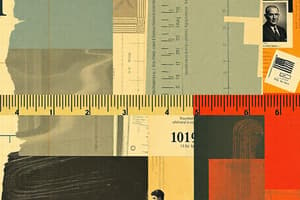Podcast
Questions and Answers
Which unit is defined as the duration of 9,192,631,770 periods of the radiation corresponding to the transition between the two hyperfine levels of the ground state of the caesium-133 atom?
Which unit is defined as the duration of 9,192,631,770 periods of the radiation corresponding to the transition between the two hyperfine levels of the ground state of the caesium-133 atom?
- Meter
- Gram
- Kilogram
- Second (correct)
What is the gram defined as?
What is the gram defined as?
- One-thousandth of a kilogram (correct)
- Ten times a kilogram
- One-hundredth of a kilogram
- One-tenth of a kilogram
Which unit is still commonly used in everyday life for measuring small quantities of substances?
Which unit is still commonly used in everyday life for measuring small quantities of substances?
- Second
- Gram (correct)
- Meter
- Kilogram
What is the base unit for mass in the metric system?
What is the base unit for mass in the metric system?
Which unit has undergone only minor redefinitions since its adoption in 1795?
Which unit has undergone only minor redefinitions since its adoption in 1795?
Which unit is defined as one-thousandth of a kilogram?
Which unit is defined as one-thousandth of a kilogram?
What is the base unit for measuring mass in the metric system?
What is the base unit for measuring mass in the metric system?
How is the meter defined in the metric system?
How is the meter defined in the metric system?
Which unit is undergoing a redefinition to make it more precise?
Which unit is undergoing a redefinition to make it more precise?
What is the basis for defining the meter as a unit of length?
What is the basis for defining the meter as a unit of length?
Which metric unit has been part of the system since its adoption in 1795?
Which metric unit has been part of the system since its adoption in 1795?
What is the International Prototype Kilogram made of?
What is the International Prototype Kilogram made of?
Flashcards are hidden until you start studying
Study Notes
Systems of Units: Exploring the Kilogram, Meter, Second, and Gram
Our world is full of measurements, from the distance we travel to the mass of a coffee bean. The consistency and universality of these measurements are crucial for clear communication and scientific progress. At the heart of these measurements lie systems of units, which are sets of standards that help us measure and make sense of our physical world. In this article, we'll focus on four fundamental units from the metric system: kilogram, meter, second, and gram.
Kilogram (kg)
The kilogram is the base unit for measuring mass in the metric system. It's defined as the mass of a platinum-iridium cylinder, known as the International Prototype Kilogram, preserved at the International Bureau of Weights and Measures (BIPM) in France. However, the kilogram has been undergoing a transformation, as scientists are working on a redefinition to make it more consistent and precise. The new definition, known as the "Kibble Balance," will likely come into effect in the coming years.
Meter (m)
The meter is the base unit for length in the metric system. It's defined as the distance traveled by light in a vacuum during a time interval of (1/299,!792) of a second. This definition is based on the speed of light and ensures that the meter is a consistent unit of measurement. The meter has been part of the metric system since its adoption in 1795 and has undergone only minor redefinitions in the past.
Second (s)
The second is the base unit for measuring time in the metric system. It's defined as the duration of 9,192,631,770 periods of the radiation corresponding to the transition between the two hyperfine levels of the ground state of the caesium-133 atom. This definition is based on an atomic clock and ensures that the second is a consistent unit of measurement. The second has been part of the metric system since its adoption in 1795 and has undergone only minor redefinitions in the past.
Gram (g)
The gram is a derived unit for measuring mass in the metric system. It's defined as one-thousandth of a kilogram. The gram was part of the original metric system and has remained a fundamental unit of measurement. Although the kilogram is the base unit for mass, the gram is still used in everyday life, especially for measuring small quantities of substances.
Each of these units has played a critical role in shaping our understanding of the physical world. The metric system, and these units in particular, has been adopted by nearly all countries around the world, demonstrating its utility and universality. By learning and understanding these fundamental units, we can make more sense of our world and the measurements that help us make sense of it.
Studying That Suits You
Use AI to generate personalized quizzes and flashcards to suit your learning preferences.




